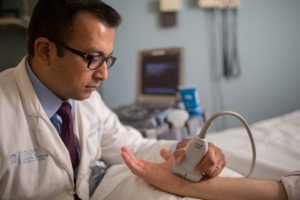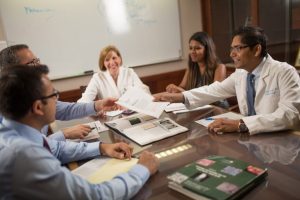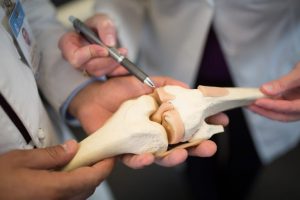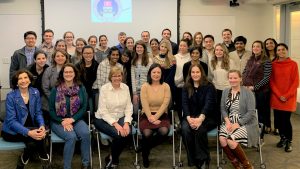Training
Patient Care

Hands-on training, and hands-on care are inseparable components of a well-rounded fellowship program. For that reason, all fellows are actively engaged in the clinical care of a cohort of patients they follow throughout their training. This allows them to gradually increase their competence and independence as clinicians, while still under the direct supervision of the attending faculty member(s). Our faculty and fellows work side-by-side in order to form one cohesive team with common goals.
Training is further enhanced by enabling fellows to participate in combined clinics and the close working relationships we maintain within our division and across other divisions, departments and programs at UNC, a few of which include: allergy/immunology, pulmonology, dermatology, nephrology, neurology, ophthalmology, orthopedics, sports medicine, rehabilitation, pain management, pediatric rheumatology, and physical and occupational therapy.
Two Major Practice Settings
- Rheumatology Clinic — at the UNC Eastowne Multidisciplinary Medical Building (facility includes other practices and services such as Radiology, Therapeutic Infusion Center, Pharmacy, etc.)
- UNC Hospitals
Active Continuity Clinics
- Treats full spectrum of rheumatic diseases
- Includes a broad patient mix with respect to age, ethnicity and socioeconomic status
On-site Infusion Suite
- Fellows prescribe and monitor patients receiving biologic therapies
Dedicated Musculoskeletal Ultrasound Clinic
- Fellows perform musculoskeletal ultrasound and ultrasound-guided therapeutic aspirations and injections under supervision from trained instructors
Specialty Clinics Available as Rotations
- Dermatology, lupus, pediatric rheumatology, sports medicine, vasculitis
In-Patient Consultation Services
- Medical and surgical units
- Multiple active critical care units
Clinical Conferences
Didactic learning is varied and includes multiple training opportunities:

Core Conference Series for Fellows
Faculty and fellows meet each Wednesday morning for a Core Conference Series which includes topic reviews in rheumatology, a journal club, and a rheumatology board review.
A few examples of the types of topics covered:
- Basic Science Journal Club
- Clinical Journal Club
- Dermatology Pathology Conference
- Diversity, Equity & Inclusion Journal Club, combined with Allergy/Immunology
- Renal Pathology Conference
- SLE treatment – renal and non-renal
- Spondyloarthropathy cases
- Scleroderma: etiology and pathophysiology
- Osteoarthritis
Weekly Rheumatology/Allergy/Immunology Grand Rounds
(Presented by faculty, invited speakers, and fellows.)
Faculty, rheumatology and allergy/immunology fellows, residents, and medical students meet weekly for a combined Rheumatology/Allergy/Immunology Grand Rounds. Grand rounds lectures are presented by fellows and UNC faculty. In addition, thought leaders from other institutions are frequently invited to present at these meetings.
A few examples of topics covered include:
- Moving from genetics of rheumatoid arthritis to function
- Dermatologic manifestations of lupus
- Idiopathic inflammatory myopathy
- Anaphylaxis in the infusion center
- Power Point and Beyond: Perspectives on giving medical and scientific talks
- Physician well-being and burnout: How do we take care of our own?
- Using social media to improve patient-centered care in the academic medical setting
Weekly Case Conferences
Each week, a case “conference discussion” in rheumatology follows grand rounds. Fellows present cases from in-patient consultations as well as outpatient rheumatology clinics. The focus of the conference is to present complicated cases, diagnostic dilemmas, and management challenges for discussion amongst the faculty and fellows.
Monthly Review Conferences
Review imaging studies on patients seen in outpatient and inpatient settings. Fellows have the opportunity to hone their skills in reading plain radiographs, MRIs and CTs of the musculoskeletal system.
Scholarship

Scholarship is part of a long tradition here. Multidisciplinary research teams come together to address critical clinical questions.
- All post-doctoral trainees in the research track choose a faculty mentor, based on their interest and the mentor’s expertise, who will guide them through their research training.
- Opportunities are available in clinical, translational, and basic research.
- Fellows in training and their mentors meet regularly with the Scholarly Activity Committee.
- Committee members:
- Meet at least quarterly with each fellow and their mentor
- Review proposed scholarly activities for feasibility
- Provide guidance and feedback on design, plans, timelines and final products for fellows
- Provide support and feedback to mentors
- Committee members:
TRACS
Fellows interested in a career in clinical research are eligible to participate in the Translational and Clinical Research Curriculum.
The program is geared towards fellows and junior faculty interested in a career in clinical and translational research. This formal research training program is offered through the Translational and Clinical Sciences Institute (TraCS), home to UNC’s NIH-sponsored Clinical and Translational Science Award (CTSA).
Carolinas Fellows Collaborative
 Fellows in training at participate in the “Carolinas Fellows Collaborative,” in which UNC joins forces with other rheumatology programs in North and South Carolina to promote excellence in clinical care, and enhanced scholarship in rheumatology.
Fellows in training at participate in the “Carolinas Fellows Collaborative,” in which UNC joins forces with other rheumatology programs in North and South Carolina to promote excellence in clinical care, and enhanced scholarship in rheumatology.
This program has been in place since 2004, and has been designated by the ACGME as a “Best Practice Innovation in Medical Education.” In this program, twice-yearly meetings take place at UNC, Duke University, Wake Forest University and the Medical University of South Carolina (MUSC). The summer meeting (“Rheumatology 101”) is held at Wake Forest University during the summer, while winter meetings rotate among the other universities. The meetings are held in a seminar format, and feature local experts and invited speakers. All fellows have an opportunity to practice their skills under the direct supervision of rheumatology faculty.
ROSCE
Fellows participate in a Rheumatology Objective Structured Clinical Examination (ROSCE) held at the Carolinas Fellows Collaborative winter meeting each year. This formative exercise is designed to give fellows an opportunity to demonstrate their competency in integrating essential skills such as history taking, physical examinations, clinical reasoning, and medical knowledge in the rheumatic diseases.